
Warning! Air raid alert: How do Ukrainians monitor Russian missiles and drones through messaging app?
In the Ukrainian language, alert and anxiety are translated by the same word "тривога" [trivoha]. And if the first sirens back in February 2022 caused a variety of reactions, including daze and panic, now civilians perceive such sounds with much more composure, calculating how much time they have and what tasks are possible to accomplish while Russia's missile tracks its target.
Checking the online air alert map and several Telegram channels before bedtime has been a part of my family's evening routine for two years now. "There is information about the takeoff of seven Tu-95 bombers from Olenya airfield," one of the posts reads. "We expect the missile launches at around 4:30-5:30 am."
At the same minute, my mind goes to worst-case scenarios, and the "missile threat" protocol is activated in my apartment.
I turn off the gas, open the windows, leave a survival kit and folding chair in the hallway. Then the key task is to dress my three-year-old son warmly and put him to sleep on a blanket. Doing so allows me to easily wrap him up and carry the child to the shelter asleep.
Taught by last year's attacks on Ukraine’s energy infrastructure(when there could be no electricity for several days), we sometimes start laundry. But I remember washing my clothes this afternoon.
Actually, I have no idea if I will wake up to sirens today. Ukraine, including the occupied territories, is 604,000 km² and is divided into 24 regions, each almost as large as Belgium. If a group of "TUshkas", as we call the warplanes, has already taken off somewhere in Russia, then explosions will most likely be heard today. It might be us, or maybe we will just read about the explosions in the morning news posted on the same Telegram.
Nevertheless, advanced preparation allows one of us to sleep until the missiles are 300 kilometers from the city, and then quickly get ready and go to the shelter. Although today I definitely don't feel like it. My child has a fever. Probably, I won't sleep at all.
Telegram as a news source
When Telegram first appeared, it was mostly used as a messaging app, similar to WhatsApp, Viber, Facebook Messenger, or Skype. Users can also create a channel (blog), posting content as a chain of information messages. Short and fast. The follower has the opportunity to read only what he or she likes - for free, without annoying ads and recommendations. And most importantly, it is not as sensitive to Ukrainian reality as Meta or now X, for example.
I may be wrong but do not exclude that for this benefit, Ukrainians often tolerate the platform's Russian origin (created by Pavel Durov, a Russian in exile).
Moreover, in July 2023, the Civil Network OPORA published a study that showed that social media is the main source of information for 80% of Ukrainians. And 71.3% choose Telegram among others.
Many of the so-called channels are anonymous. It often concerns the state’s National Security Council, Special Services, or Defense Intelligence due to the possibility of Russian PSYOP. As well as it means that social media swarms with unverified information.
As alternatives to anonymity, government departments and public services began to offer their channels. Moreover, the trend on Telegram was quickly embraced by politicians and officials, who suddenly appeared as bloggers, satisfying people's curiosity for up-to-the-minute information from sites where the public is usually not allowed.
Consequently, city mayors, heads of regional administrations (the Ukrainian equivalent of governors) as well as national and local media were the first to report the threat from the air. This was especially important in locations that did not yet have a proper warning system.
Back in those days, missile threats could be announced for various reasons, and very often spread throughout the entire Ukraine. I remember, my neighbors and I spent hours in the basement, awaiting the all-clear signal.
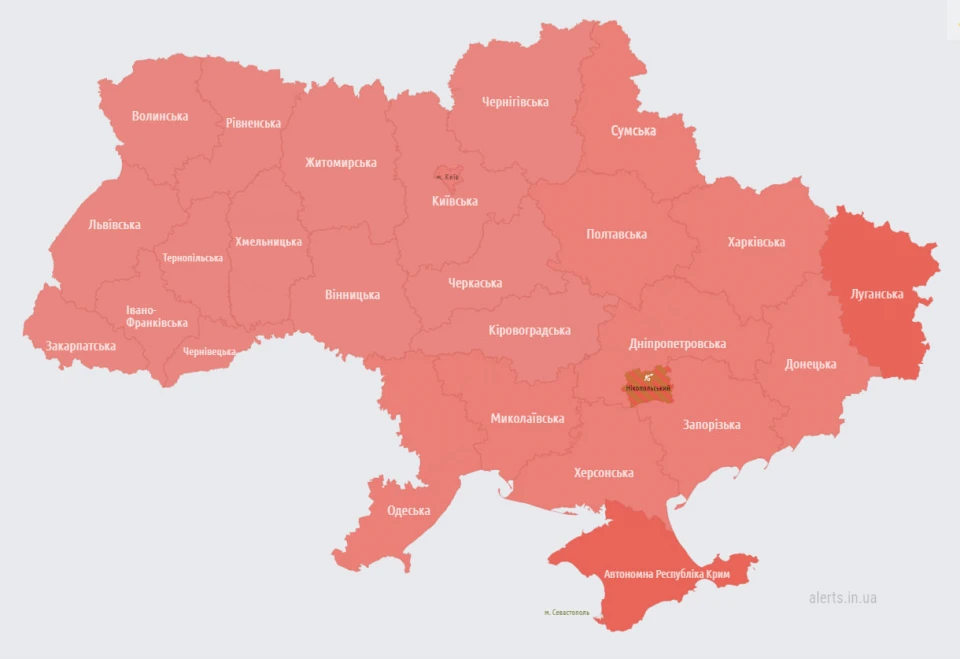
And one day they started leaving the shelter even before the siren sounded. The era of monitoring channels on Telegram had started.
Who is Vanyok from Mykolaiv and what Ukraine’s Air Force does not write about?
“First of all, I read the ‘official’ Telegram channels,” says Olena, a TV journalist from Kyiv. The resources of Ukraine's Air Force, Kyiv City State Administration, officials, and public media are at the top of her list.
"For missile threats, this rule is also relevant. I simply trust them more," answers Olena, guessing my next question.
Official Telegram channels were among the first to report air danger. However, their messages are usually quite brief.
"Missile danger. Stay in shelters," posts the head of the Kharkiv Regional Military Administration, Synyehubov (over 102K subscribers).
At the same time (and even 2 minutes faster), one of the above-mentioned anonymous monitoring channels announced: "Attention! Ballistic missile launch from Belgorod to Kharkiv/region."
This makes it clear that the situation is incredibly dangerous. This type of missile is one of the most difficult targets for air defense systems.
Meanwhile, anonymous sources from Telegram have been repeatedly criticized, including by the Air Force. They even warned of criminal liability for the administration of Telegram channels that 'provide the enemy with information about Ukrainian air defense locations and weaknesses'.
"Who controls them [Telegram channels] is an extremely important issue requiring special monitoring. We are not talking about the official Telegram channels of the heads [of local authorities – ed.], but those that report on the movement of enemy missiles, Shahed UAVs, etc." said Colonel Yuriy Ihnat, spokesman for the Air Force of the Armed Forces of Ukraine, on the air of a national telethon last March.
However, the channels operate at their own risk, providing information, raising money for the military and publishing news and even job ads.
And civilians are actively monitoring them because they want to know more and somehow plan their own life amid war and constant danger.
"A colleague of mine told me that she reads ‘Vanyok’," says Olena. "If he posts that the aircraft will take off and in 2 hours the missiles will be here, she sets the alarm clock, gets up at night, drinks coffee and goes to the shelter."
Nikolayevsky Vanek (Vanyok of Mykolaiv) is one of the most popular channels with over 2 million subscribers. Many journalists have tried to find out who Vanyok is. Presumably, he (or maybe she) is linked to the head of the Mykolaiv Regional Military Administration, Vitaliy Kim.
"This exclusive costs a lot, so I won't tell you. For half the price I can give you a hint," said Kim in an interview with NV, answering a question about who Vanyok is.
Nevertheless, the Air Force decided to finally step in and launch its own Telegram channel in June 2023.
"In the Air Force, we will eventually do this as well, citizens are concerned about it, there have been many requests from the media," Ihnat said. He also noted that they will not detail where exactly the missiles are flying, only indicate the direction."
Tracking the missiles online

photo: gettyimages
Unlike Olena's colleague, I don't have to set an alarm. Around 5 a.m., I was woken up by Vanyok, Rocket Danger, the Air Force, and 10 other channels I subscribed to before writing this article. The siren outside my window also howls...
“At night I wake up to explosions and go to the corridor. Then I follow the news on Telegram to know when I can go back to sleep," I recall my morning conversation with Olena and think, "I wish I had such strong nerves."
"You'll either go crazy and be super tired if you react to every alert, or you'll sacrifice safety to maintain your sanity. Unfortunately, there is no right choice, because both are bad. But, unfortunately, this is the reality. And sometimes I don't even hear the warning, because I'm so used to it," Olena explained her lack of caution.
As for me, I prefer to be crazy and tired tonight.
But I can afford it, I live near the Polish border in the western city of Lviv. Kyiv suffers more attacks. Last year, the Iranian-made Shaheds almost kept the city's residents awake.
Lviv is far from the seacoast or Russian border. Nevertheless, experts estimate that the hypersonic Kinzhal missile would take a little more than 5 minutes to reach the city, but the Russians usually aim for the West with less hyped and slower models.
Approximately, we have 40-60 minutes. But the missile's route could be longer because the cunning Russians are trying to outsmart our air defense. So the rockets spin around Ukraine and then suddenly turn around and head for Kyiv, for example. Sometimes they "disappear" on the way.
During this time, it is possible to finish not only the laundry but also clean the entire apartment. But does it make sense if everything is at risk of burning down right now?
Meanwhile, there are explosions in Kyiv. City’s Mayor Klitschko writes that air defense is working. It seems it was Kalibrs from the sea. But the "Tushki" also launched missiles, and they are approaching: one group in Rivne region, the other in Vinnytsia.
"Next time, don't wake me up until they announce that the missiles are already crossing the border of the Ternopil region," said my husband after I "forced" him to run to the basement a little bit too early a few weeks ago.
So I'm waiting... But this time missiles come from Volyn in the north.
I give fever-reducing medicine to the child. Rocket danger (432K subscribers) gives us 12 minutes to reach the shelter.
No time to read the Telegram
The day before, I was arranging an interview with Yevhenia, who holds down jobs as a fitness trainer and graphic designer in Odesa. While waiting for a response, I received another message from the Kudy Letyt? (literally “Where does it fly?”): ”Kh-59 missile is moving towards Odesa.”
“Could you call me after 10 pm?” writes Yevhenia.
“Of course,” I type the answer.
“Explosions in Odesa. The missile has ceased to exist,” reads the next Kudy-Letyt’s message two minutes later.
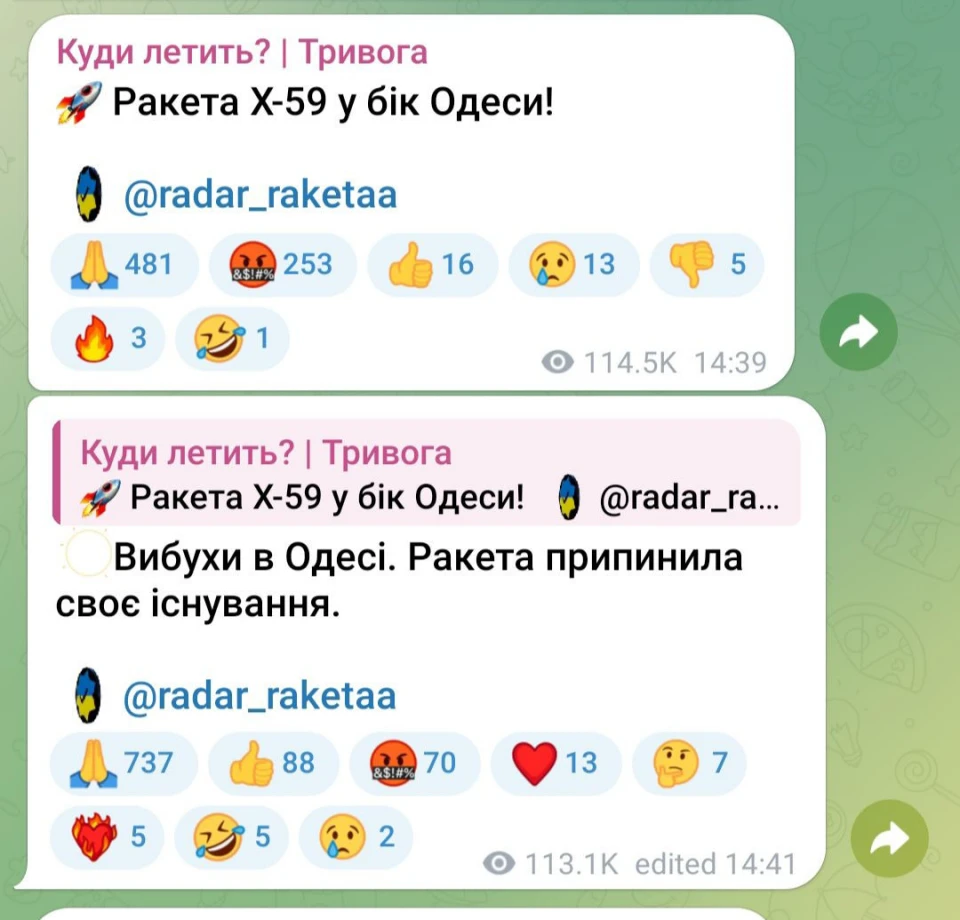
Message on Telegram: ”Kh-59 missile is moving towards Odesa.”
“Explosions in Odesa. The missile has ceased to exist.”
When I tell Zhenia (In Ukraine, this is how Yevhenia is commonly called - aut.) about the message, she interrupts me excitedly as if we suddenly discovered that we had a mutual friend.
"The same rocket flew over my head. It was buzzing and whistling so loudly that I ran out of the room with my laptop," Yevhenia shares her impressions. “Moreover, I was working with a girl online, she lives two blocks above, and she was the first to hear the whistle. She said, Zhenia, something is flying, and then I heard it too."
Mostly, people living in Odesa endure strikes by ‘kamikaze’ Shahed-type drones. The nighttime attacks are so torturing that sometimes Yevhenia's family considers moving out of the city. Still, the missiles do not bypass Odesa either. In this case, people have a minimum of time to hide, even if they are warned about them in advance.
All Yevhenia is able to do is to quickly grab her child and hide in the closet. At least with better noise insulation the kid will avoid being frightened by the explosions.
"When drones fly over Odesa, we can see which neighborhood is under threat. They [Telegram channels] write 'Arcadia', 'Fontanka', 'City Center'," Zhenia says.
Sometimes it happens for several days in a row.
"Do you like Star Wars?" I hear Yevhenia's husband in the background. "Come here, it's shooting and exploding like in the movies."
A few hours later, the empire strikes back…again. It is already thundering and whistling somewhere close to me. 12 minutes to reach the shelter is nothing when you're arguing with all the family about whether to take a flu-sick boy to an overcrowded basement in a safer building across the street. However, now I realize that listening to missiles under the stairs of the ground floor is a questionable experience.
With trembling hands, I try to put the child's cape on, my fingers slippery with sweat, barely scrolling through the messages on my smartphone. Another group of rockets spins around the outskirts of the city. Screw it. I still have enough time to find a people-free corner in the shelter.
Threat awareness gives civilians a sense of "mastery over the situation"
Kharkiv, which is located 50 kilometers from the border and less than a hundred kilometers from the Russian city of Belgorod, suffers from various attacks almost 24/7.
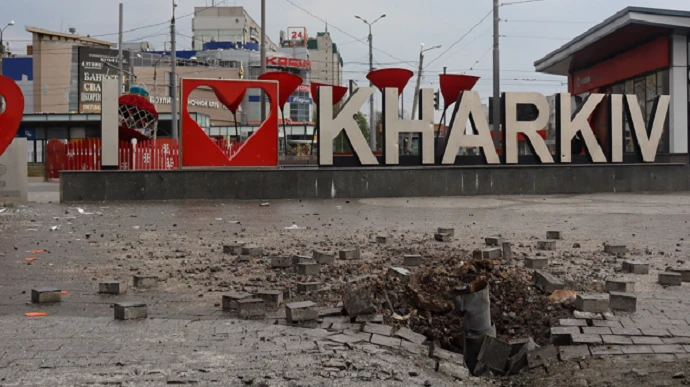
To strike this eastern Ukrainian city, Russians often use anti-aircraft missiles from S-300 air defense systems, which they have converted into ballistic ones. According to Kharkiv residents, these missiles launched from Belgorod reach the city in about 40-50 seconds.
"We have a kind of black regional Kharkiv joke: if the siren sounds, the missile has probably already hit. That is, if the warning is for Ukraine, but somewhere it flies over the region and moves further, then it makes sense. If this missile is aimed at Kharkiv, then usually there is no alarm. They just don't have time to activate it," says Ihor, a 21-year-old student living in Kharkiv.
If you add up all the time that Kharkiv was under threat of destruction in February, we will get almost 7,5 days under fire (or risk of fire) which is almost a quarter of the entire time.
Ihor says that when he returned to Kharkiv last March, he did not recognize it. The city, which had always been full of young people with a kind of student vibe, had become much emptier. However, a lot of people, despite the constant threats, are still reside and work, love, create and enjoy life there.
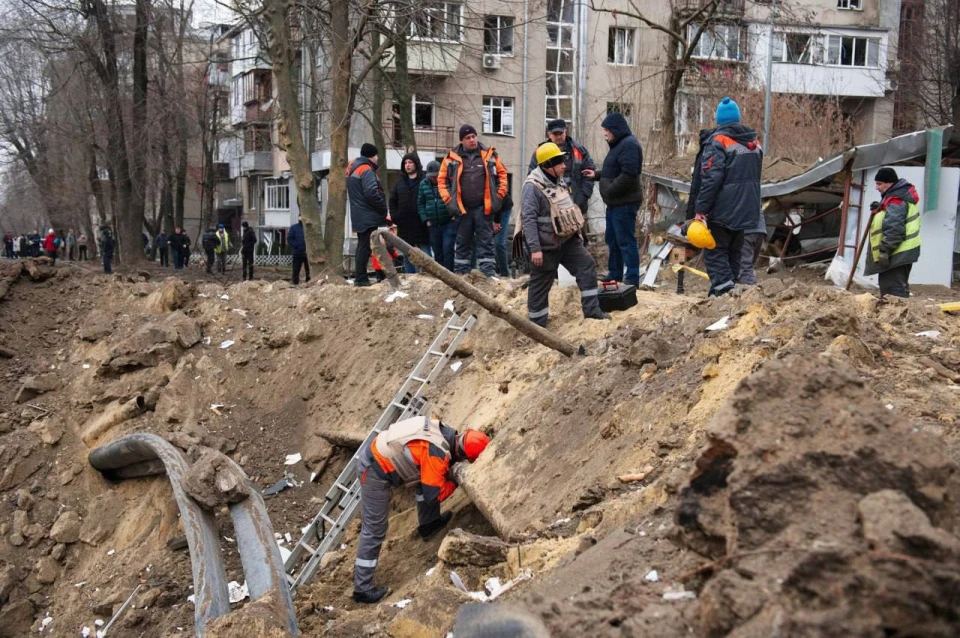
Photo: aftermath of the missile strike on Kharkiv / Telegram channel of Kharkiv Regional Military Administration
"A person cannot live in stress all the time. And the psyche tells: That's it! We no longer consider it stressful, we are no longer afraid of it." Is this good? Of course not. It's quite scary," says Ihor. "For me, it's like background noise that doesn't carry information about danger. I still stay in the apartment. Because even if I go down to the shelter, nothing will change. Because I am relatively safe at home and relatively safe in the shelter."
He admits that despite this adaptability, people he knows still want to keep up with what's going on in the city.
“People really do follow Telegram channels, tracking takeoffs and launches. I don't know how much it helps in terms of protecting themselves, for some it's in terms of curiosity, the illusion of control. If I know that it (aircraft) is taking off, then I am 'aware and armed'. It's a very funny illusion, but people seem to feel better following these sources,” Ihor concludes.
Scary but not scary MiG
"We're sitting at a table, drinking filter coffee, the air raid alert starts, and we obviously do what everyone else does, we check the Telegram channel and continue to stay where we are, but with a more serious face. MiG. MiG. MiG with refueling - everything is fine,” says stand-up comedian Vasyl Baidak in his performance, describing a typical situation for a person living in Ukraine.
“Waiter, could I have two more avocado toast? And two more filter coffees, please," he continues with a laugh at the background. Many of those from Baidak’s audience familiar with such kind of situation.
The Russian MiG-31K fighter aircraft is simply a casual thing. A carrier of Kinzhal cruise missiles (those that can reach Lviv in 5 minutes) takes off somewhere in the Russian village of Savasleyka several times a week. This could be a training flight. The jet may be redeployed to another airfield. But no one knows for sure whether it is armed with missiles. That's why air alerts are announced all over Ukraine and can last for an hour. Or maybe even three, if the MiG is accompanied by an Il-78 that refueled it in the sky.
And it seems that MiG and Telegram are a perfect match. Because we already know through social media channels that MiGs often fly and do not launch missiles.
“If I hear a siren during the day, I look at the Air Force [Telegram channel] to see what is flying. If it's a MiG, I do nothing. If it's missiles or ballistics, I watch more carefully,” says Olena from Kyiv.
However, those with weaker nerves (like me) check the app on their devices every 5 minutes to make sure 'Kinzhals' aren't flying while they enjoy their avocado toast with coffee.
But to be honest, the latter is not so simple. If an air alert is announced, everyone must behave... as if it were an air raid alert. That is, to take shelter. Companies that do not operate underground should stop working. So it is highly likely that you will be asked to leave the café.
Speaking about her experience, Olena recalls that the biggest problem caused by the MiG is transportation, as she lives on the Kyiv left (eastern) bank.
"The subway runs there above ground, so it doesn't work during air alerts and I have to take a taxi to get to work," she says.
Every alert means potential losses, especially for small businesses.
"Each MiG-31 takeoff is a minus of 20-30% of the restaurant's daily revenue," Olha Nasonova, CEO of Restaurant Consulting, told NV in April last year.
At that time, annoying Russian MiGs regularly took off from Belarusian airfields in Machulishchi and Baranovichi and drove civilians, who were forced to pause work and wait for the alert's end, crazy. Was it intended as sabotage to harm Ukraine’s economy? Perhaps someday we will find out.
"At the end of 2022, preliminary calculations were made of possible losses associated with air raids. At that time, the air alert was estimated to last 3-4 hours and the figure was minus UAH 7.4 billion (USD 200 million) of GDP," economist Oleh Pendzin said during a telethon in November 2023.
Since then, a lot of things have changed. Shops, beauty parlors, and restaurants continue to work and close when the missiles or drones are likely to have been launched. How do they know if the threat is real or not? I might have a theory.
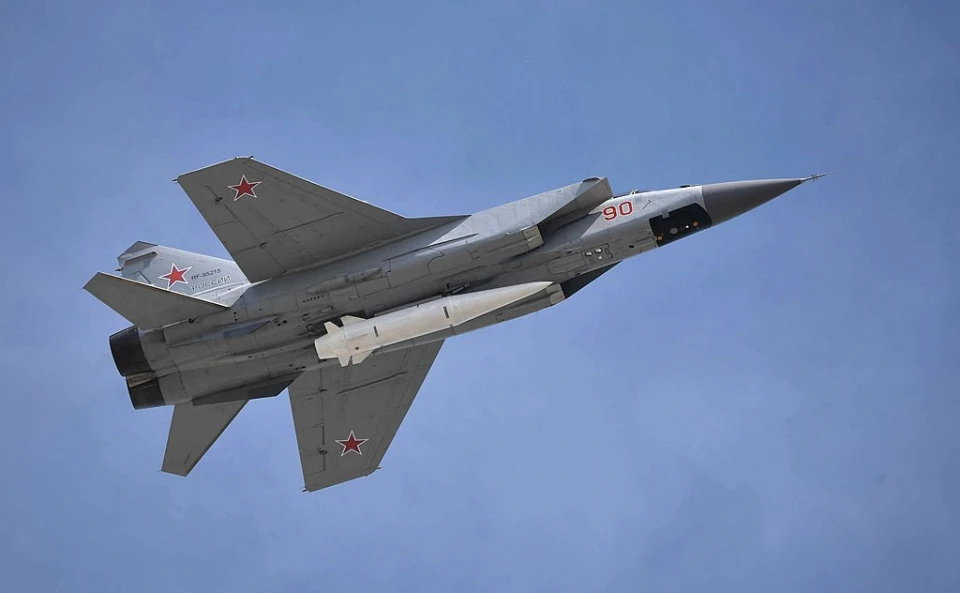
Photo: MiG-31К/ wikipedia
"By the way, kindergartens and schools are still spending MiG-times in the shelter. I live 5 minutes away from the kindergarten and mostly work from home. That's why, in the case of 'MiG, I manage to pick up my son while the teacher struggles to dress the whole group. And then each of the children finds it necessary to notify me that it's probably a MiG and nothing will happen.
It's very sad to realize that for children, wartime situations have become the norm.
This time, after my son's fever broke, he is awake but doesn't react much to what is happening. He is too familiar with the situation, either. My parental duty is to be afraid for both of us.
Perhaps, I am lucky enough to still be afraid of missiles.
With the sound of warning sirens mixed with the sounds of fire trucks and ambulances, we go outside. This time the explosions were a few blocks away. The sky is extremely beautiful and the morning is wonderful, just perfect for some avocado toast and coffee.
- News












































